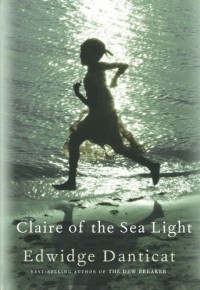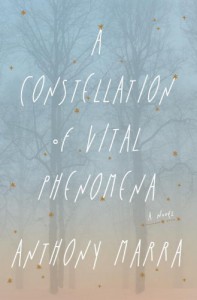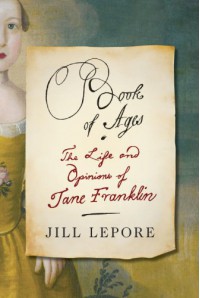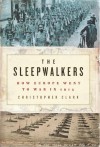Lucky Us Review

This is a hard book to review because, on the one hand, it is a shapeless mess, filled with wildly improbable events, and ends by even more improbably tying everything up into a neat bow. But on the other hand, once I got into it I could not stop reading. I liked Eva and Iris in spite of myself. And it boasts a killer opening: "My father’s wife died. My mother said we should drive down to his place and see what might be in it for us."
I don't think this is great literature, and nothing like as good as Amy Bloom's short stories, but I ultimately found it irresistible.
 1
1
Eleven Days, Lea Carpenter

I find it so difficult to say interesting things about books that I love. Encomiums tend to be a bit dull, and also ring a bit hollow.
So what can I say about this book? It was, to me, very nearly perfect. Beautifully written--not in a showy way, but very elegant. Every word rang true. It is a page-turner, almost a thriller, but it is also, unexpectedly, a novel of ideas. Ideas about war and parenting and love. Sara and Jason felt real to me. I can quibble with some minor aspects of the book--Jason's motivation for entering the military was a little trite, some perspective shifts near the end did not work--but the core is solid.
(I recognize this review is maddeningly vague. I am trying not to spoil anything.)
All I can really ask of a novel is that it sticks with me once it is finished. The best novels enable you to see the world from an entirely new perspective--to me, that is the purpose of fiction. This book did that. Read it.
 1
1
The Signature of All Things, Elizabeth Gilbert

This is a hard book to rate, because it is chock-full of flaws, yet I fell hard for the main character. Alma is the only character in this book who is given any depth at all. Retta is a Manic Pixie Dream Girl ratcheted up a couple of notches (yes, she is every bit as annoying as that description sounds). Prudence is an enigma until she becomes a cliche of a different sort. Henry and Ambrose and the minister are all straight from central casting.
But Alma comes alive. At least she did for me. I don't know quite what to make of Gilbert's insistence on Alma's physical unattractiveness--I kept wondering whether someone as smart and interesting and passionate as Alma could really be as ugly as Gilbert repeatedly tells us that she is. But I loved Alma's desire to know how everything works--everything, from her mother's accounting system to the growth of plants to the human heart. I loved that she seemed to have a perfectly productive and content life, most of the time, without being hung up on romance. I loved that there weren't a lot of scenes showing her longing for a husband and children. But most of all, for reasons I can't quite articulately explain, Alma felt very much like a real person to me and twelve hours after finishing the book, I am still trying to figure out how to manipulate the space-time continuum so that she and I can hang out and talk about moss.
There are so many problems with this book--so many things I don't like: Prudence's story, from beginning to end. Retta's story, from beginning to end. The character of Tomorrow Morning. The fact that Tomorrow Morning is named "Tomorrow Morning." The way Gilbert seems to just give up in exhaustion rather than coming up with a coherent, sensible ending. But I loved Alma, and for that reason alone, the book felt worth my time.
Big Brother

It's hard to know what to say about a book in which the author is so obviously laying out her own personal issues. (As described here.) I can't help but wonder if she would have been better off just talking about some of this with a therapist. It's an interesting (if odd) book, not badly written, but some of the characters who are supposed to be attractive and sympathetic just seem like asses. And the author seems to want us to approve of the protagonist's unkind, even punitive treatment of her brother--which makes some psychological sense given the backstory, but very little sense within the world of the novel.
Claire of the Sea Light

I do love the way Edwidge Danticat writes. This book is full of lovely passages but never feels overwritten. You never get the idea that Danticat is trying too hard; this is just the way she expresses herself. The book feels effortless, and yet it's hard to find a page without a memorable, evocative paragraph.
For example:
It was so hot in Ville Rose that year that dozens of frogs exploded. These frogs frightened not just the children who chased them into the rivers and creeks at dusk, or the parents who hastily pried the slimy carcasses from their young ones' fingers, but also twenty-five-year-old Gaelle, who was more than six months pregnant and feared that, should the temperature continue to rise, she too might burst. The frogs had been dying for a few weeks, but Gaelle hadn't noticed at first. They'd been dying so quietly that for each one that had expired, another had taken its place along the gulch near her house, each one looking exactly the same and fooling her, among others, into thinking that a normal cycle was occurring, that young was replacing old, and life replacing death, sometimes slowly and sometimes quickly. Just as it was for everything else.
(I defy you to find a more elegant paragraph about exploding frogs.)
And yet, much like Colum McCann's Transatlantic, all of the gorgeous words don't seem to add up to much. Danticat does a wonderful job of creating her setting--Ville Rose, a small village in Haiti--but she doesn't seem to do a lot with it. Claire of the Sea Light is less a novel than a series of connected short stories, so we meet many of Ville Rose's inhabitants. But most of the characters, with the exception of Nozias, lack depth.
The book's milieu is intriguing, but the themes are slight. And--again like Transatlantic--the stories don't come together at the end in a satisfying way. I don't need everything to wrap up neatly--that would be far too artificial--but I do want to feel at the end that every character's story was vital to the larger themes of the book. And I didn't get that here. Instead, as I finished the last page, I just felt wistful for the book this could have been if Danticat had plumbed the depths of her characters and their village just a bit more.
Big Brother, Four Chapters In

Am I supposed to think that the narrator is horrible, judgmental, and mean? Because I really, really do.
A Constellation of Vital Phenomena

I admired this book more than I loved it. Anthony Marra writes beautifully (although some passages seem a shade overdone) and many sections are very moving. Marra is also a great observer of details. In particular, I liked these moments from early in the book:
And now, in the morning, as he tightened the orange scarf around her neck, he found a fingerprint on the girl's cheek, and, because it could have been Dokka's, he left it.
After crossing herself, she lay back on the divan and squirted a cool puddle of hand lotion from the bottle she'd brought from London. Invariably she would apply too much, and her hands would be slick and shiny in the candlelight as she asked for another pair with which to share the excess.
On the other hand, though, the plot mechanics were a bit too neat and relied too heavily on coincidence; the characters' lives all fit together like the pieces of a jigsaw puzzle. Several revelations in the book fell flat for me because I was shaking my head at their implausibility.
A bigger problem is that none of the characters ever really feel like real people. In particular, Havaa does not sound remotely like any eight-year-old girl I've ever known; but really, none of the characters seems to have much personality. Given the epic sweep of the story, this isn't the fatal flaw it might be in another book; Marra isn't trying to write an intricate character study. But it made it hard for me to connect with the book the way I might have.
Still, there's a lot to like here, and I'm certainly glad I read it.
The Daylight Gate, Jeannette Winterson
I had every intention of loving this book, but unfortunately it didn't grab me the way that Winterson's novel Oranges Are Not the Only Fruit or her memoir Why Be Happy When You Could Be Normal? did.
Winterson's writing in this novella is as vivid and evocative as always, but I wanted more character development and more context. I knew nothing at all about the Pendle witch trials in Britain when I began the book (indeed, I was only vaguely aware that the book is based on a real event in history) and I wonder if I would have gotten more out of the book if I'd know as much about Pendle as I know about Salem, Massachusetts. As it was, I felt like there were too many characters for such a short book, and too much suggestion without much background.
The Goldfinch

It is terribly disappointing to dislike a book that you expected to love. To be fair, I didn't exactly dislike The Goldfinch--there are captivating moments and characters and scenes. But Tartt has a tendency to meander, and there are long stretches of the novel that just aren't particularly interesting. And then the last several pages (I read it on my Kindle, so I can't say exactly how many) consist of Donna Tartt taking her many plot strands into her hands and desperately trying to weave them into something with Deep Philosophical Meaning. I liked her final paragraph but wow did it take her a while to get there; the final chapter of the book read as though she'd been assigned a twenty-page term paper but had only fifteen pages' worth of thoughts. It's hard to believe that a book ten years in the making needed more time to marinate, but that's the conclusion I came to.
 2
2
Empty Mansions

This is less a review of the book than of Huguette Clark's life. I give her 4 1/2 stars for staying true to her own peculiar self for more than a century. I don't know that this is a great book viewed strictly on literary terms--the writing is purely serviceable and I don't think the organization works well--but the story of Huguette Clark is going to stay with me for a long time.
I said in my post yesterday that Huguette Clark was happy, and she certainly was for a long time. But something happened as she got older. Her staff dwindled. She developed a facial cancer that was left untreated for a significant period of time. When someone finally sought treatment for her, the cancer had made it nearly impossible to eat and she had almost starved to death. she required cosmetic surgery to repair the damage to her face, and she was no longer able to eat solid foods. (The big flaw of this book, in my opinion, is that there is a ten-year gap which goes undescribed, that might explain how this possibly could have happened. Yes, her staff was smaller -- but you would think that even a staff of one could have prevented the cancer from advancing so far before it was treated.) It is astonishing that she managed to recover from this cancer and then live another two decades.
As I suspected, the last twenty years, which she spent in the hospital, took a dark and disturbing turn. She was still, in many ways, happy. But she was also clearly taken advantage of, by her attorney, her accountant, and most significantly, her beloved nurse, to whom she gave literally millions of dollars over the course of twenty years. (Clark paid for the nurse's children's school from preschool through college. She paid for vacations and camps and summer homes and a Bentley.) Clark's will cut out her family completely, leaving vast sums to caregivers, as well as establishing an arts foundation in California.
When she died at 105, her half-nieces and nephews (who had barely seen or spoken to her since the 1950s, if then) were shocked to hear they'd been left out of the will and sued. And although they may have been legally and even ethically right--as I said, Clark was clearly taken advantage of--it's hard to feel sympathetic or morally indignant on behalf of a group of people who didn't even bother to check on their elderly aunt after 9/11, or during the 2003 power outage in the heat of the summer. (The book ends before the final settlement, but you can read about it here. Essentially, the nurse was the big loser.)
You read this book and you want to draw some kind of lessons from Clark's life. Huguette Clark made herself comfortable in her hospital bed for two decades, but she died more alone than she realized, having for many years trusted people who were not trustworthy. When I turned the last page, I wanted to call everyone I knew just to extract promises that they would not leave me alone in a dark apartment in my old age. I thought, she should have gotten out more. She shouldn't have isolated herself. But that's not a rational response. Clark's main problem was that she outlived everyone--her doctors, her lawyers, her dearest friends. No amount of face-to-face contact would have prevented that.
It is tempting to look at the end of her story and allow it to color her whole life, but that would betray years of contentment and even joy. The authors of this book, to their credit, make this point well: "She was a recluse in that she locked herself away from travel and sunsets and cafes, but a woman who leaves twenty thousand pages of affectionate correspondence is also a world traveler."
New York Times: Top Ten Books of 2013
How is Far From the Tree not on this list? I just don't understand.
Also baffled by the love for Americanah and The Flamethrowers.
 1
1
Empty Mansions, at the Halfway Mark

After the first couple of chapters, I described this book as "sad and creepy in a Grey Gardens kind of way." But as I've read more about Huguette Clark, I've realized that the key difference between her and poor Edie Beale is that Huguette was happy. She loved her doll collections and her miniature houses, she was busy and felt purposeful, and she had relationships that were as close and affectionate as she wanted them to be. This is not the sad story I thought it was; this is a story of a happy, loved, unconventional woman.
At least so far. There's still the last two decades of her life in which she refused to leave the hospital. But I haven't gotten there yet.
 1
1
Book of Ages: The Life and Opinions of Jane Franklin

Jill Lepore is terribly frustrating to me, because if you look at her bibliography it seems that she was put on this earth specifically to write books for me to read and yet every time I read something she's written I feel a tiny bit let down.
I really did want to love this book, and I think that the project is wonderful. Unfortunately the execution of the project felt (to me) repetitive and a little self-congratulatory on Lepore's part. Jane never came alive to me -- instead she reminded me of an eighteenth-century Stella Dallas, with Benjamin Franklin playing the part of Stella's ungrateful daughter. Ultimately Lepore's emphasis on Franklin's neglect of his sister -- he didn't save her letters, he didn't mention her in his autobiography, etc., etc. -- felt tiresome and a bit unfair.
I admire the research that Lepore must have done to pull the story of Jane together, but I found the book itself disappointing.
 1
1
Longbourn

For Jane Austen fans: I usually can't stand it when modern authors have the chutzpah to set books in Austen's universe--I have no interest in reading what about might have happened to Elizabeth and Darcy's daughters. But Jo Baker's Longbourn is a brilliant exception; she captures a lot of the feel of Austen (with dashes of Eliot and Dickens and the Brontes) without trying to mimic her voice. And because Baker centers her novel on the servants in the Bennet household, with Elizabeth and Jane and Lydia on the periphery, her book is also a useful corrective to Austen's exclusive focus on the gentry. Really one of my favorite books I've read this year.
 1
1









 2
2
















